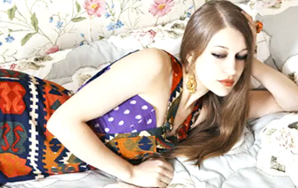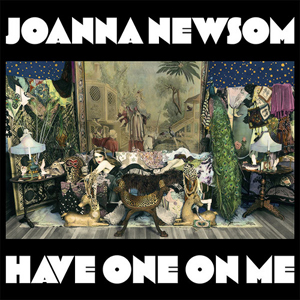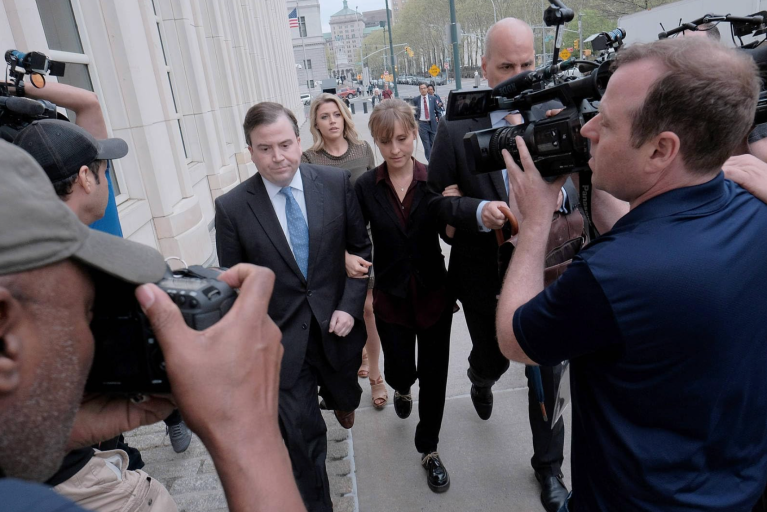
An Overly-Intense Track By Track Analysis Of The Second CD Of Joanna Newsom’s ‘Have One On Me’
You know when it’s not working, and it’s not because you don’t want it to work, but because it just won’t? And so you separate, you go on a ‘break’ so you can figure things out, you realize you need to be alone so that you can think, rediscover the self that has been so…

On A Good Day
“Hey, hey, hey, the end is near,” she sings ambivalently. It’s not a “good” day at all. The narrator received an unsatisfactory resolution to the issue of putting down roots in the preceding track, Baby Birch, and without totems of commitment on the horizon, she’s disappointed: “I had begun to fill in all the lines – right down to what we’d name her,” she says.
Aware that the future is unlikely to bring what she wants, our narrator finds her relationship in the stasis of chronic discontent, that period of time when you stay with someone even though you increasingly want less and less of the same things, when the happy future is increasingly uncertain.
“I will stay for the remainder,” she consents to wait out the relationship’s end. With “good” days here and there, there’s no imminent reason to leave, but nothing to look forward to – she knows her partner isn’t going to change and her feelings have cooled just like the frozen creek she cites in the third verse.
“Will you leave me be so that we can stay true to the path that you have chosen?” she suggests, implying she has resigned to the fact her needs are not being met. The resentment in this powerless inertia is interesting in contrast with the relatively winsome and upbeat tone of the song. It serves as a direct counterpart to the only other song on the record with “good” in its title – in Good Intentions Paving Company we have a pair consenting to move forward together out of sheer love despite insecurity and an uncertain road, and in On A Good Day, you have a pair consenting to moving forward together even though at least one of them has completely given up hope.
You And Me, Bess
Who’s Bess? She can’t be referring to any other than Black Bess, the fierce and famed steed of notorious horse thief and highwayman Dick Turpin. As the legend goes – and especially as portrayed in this WikiSource page; the poem ‘Black Bess’; by Eliza Cook – this criminal man mastered a strong and wild horse, and then rode her to death trying to flee his pursuers, an escape he wouldn’t have made without her sacrifice.
Remember the “little black mare” from “no provenance,” the spectre of apparently-groundless insecurity that turned out only to be a small and enfeebled old nag the size of a dog? That horse is back, and now she’s large and legendary, a looming and vicious terror.
The narrator sees herself just like Bess, a brave sacrifice made for her dangerous man. The entire second disc of ‘Have One On Me’ begins to illustrate a shift in power; the first disc’s determined lover, a difficult woman with an immutable desire to love, has had that boundless well of giving exploited, as often happens in codependent relationships.
She loved this man into abiding with her and even for a time felt protected by him, but as he evades commitment, the second disc shows our narrator’s journey into powerlessness and martyrdom. She knows she’ll “hang” for it, just as highwayman Turpin was hung for horse theft.
In California
You know when it’s not working, and it’s not because you don’t want it to work, but because it just won’t? And so you separate, you go on a ‘break’ so you can figure things out, you realize you need to be alone so that you can think, rediscover the self that has been so completely “sunk in this shunt” in all the mess of an intense relationship?
That’s where we find our narrator in this song, and the distance and the sense of limbo has intensified both her love and her sadness at the prospect that she may “spend my life in spitting distance of the love that I have known”, on whose caregiving of her (like in the stronger days represented in “No Provenance”) she fondly reflects.
The singer of this song accepts that there is some frailty in her codependency – “my heart became a drunken runt” that contributed to the unhealth of the relationship, and that “I must set myself apart” and address it before any decisions can be made about the love. The pain of codependent relationships can only be resolved through separation; “you cannot come and see me,” she urges, lest her lover “cross the border of my heart.” This is the first of two songs on the record that suggest an outright split between the couple.
That line – “you cross the border of my heart” – is one of the greatest on the record because of how Joanna’s voice captures all those emotions in the way she sings it: sad resignation and sweet longing, loneliness, all at once.
She knows she must address the way she’s always sacrificed herself for others, as codependents do, resenting all the things they don’t get back. Her inner garden, the seat of her own spirit that she set aside in ‘81’, has still not been well-tended, sown with “untidy furrows”, as she has mostly been “content to see my garden grow so sweet and full of someone else’s flowers.” It’s an appropriate return to garden metaphor, since if ‘81’ is a birth and origin song that desires innocence, this is a re-birth song that addresses guilt.
But the pull of love is still strong, and “time will tell” if she can address these issues and become a proper partner. However, the forecast isn’t excellent for her success; she’s uncertain and directionless, incapable of being alone, “standing in the doorway like a sentinel” capable of not much but waiting to go back to her man at “my home.”
The passing of time is painful in the face of this kind of inertia, and the way Joanna references the call of a cuckoo clock at the song’s end is heartbroken; it sounds like sobbing.











